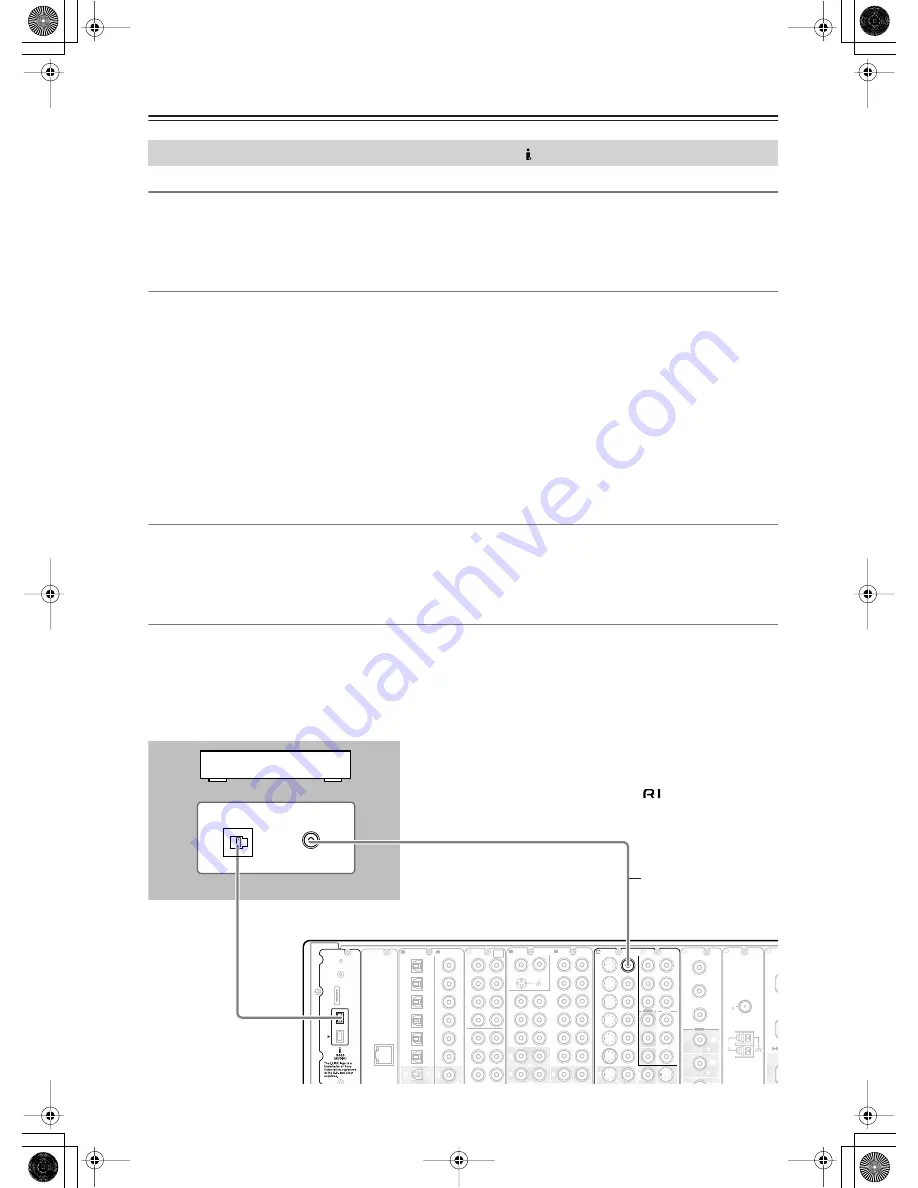
40
Connecting AV Components
—Continued
What is i.LINK
i.LINK is an appellation of IEEE1394, which is the digital interface standard defined by the Institute of Electrical and
Electronics Engineers (IEEE).
Connecting i.LINK
(AUDIO)-supported devices allows high speed transfer of data such as digital sound between the
linked devices, and their control.
What is i.LINK (AUDIO)
The TX-NR1000/TX-NR5000E supports “i.LINK (AUDIO)” of the i.LINK transfer format. Accordingly, “i.LINK
(AUDIO)” must also be supported for other devices that you want to connect to the TX-NR1000/TX-NR5000E. The
TX-NR1000/TX-NR5000E does not support other i.LINK transfer formats such as “MPEG-2 TS” used for BS digital
broadcasts or “DV” used for DVD recorders, digital video, etc. The TX-NR1000/TX-NR5000E connected to other
i.LINK(AUDIO)-supported devices via i.LINK cable enables you to transfer multichannel digital sound such as DVD-
Audio and SACD (video signal is not supported).
Even when multiple devices are connected to each other, you can perform data transfer and control of target devices via
another device.
The IEEE interfaces on the TX-NR1000/TX-NR5000E are designed conforming to the standards below.
1. IEEE Std 1394a-2000, Standard for a High Performance Serial Bus
2. IEC60958 bitstream, DVD-Audio, and SACD in the AM824 Sequence adaptation layers of Audio and Music Data
Transmission Protocol 2.0
Copyright Protection System
The TX-NR1000/TX-NR5000E supports the DTCP (Digital Transmission Contents Protection) system. The DTCP
system uses technologies for data encryption and authentication during the data transfer between the i.LINK-con-
nected digital devices in order to protect the copyright of the content against illegal duplication. To enjoy replaying
DVD-Audio, etc., the DTCP must also be supported by other devices connected to the TX-NR1000/TX-NR5000E.
How to Make a Connection through the i.LINK (AUDIO) Interface
Use the S400 4-pin i.LINK (AUDIO) cable to connect the i.LINK (AUDIO) terminal on the TX-NR1000/
TX-NR5000E to the i.LINK (AUDIO) terminal on the i.LINK (AUDIO)-enabled device.
• When using the i.LINK connection, you need to configure the audio input assignment settings in the “i.LINK” sec-
tion of the Audio Assign sub-menu (Some i.LINK-connected devices may require audio output settings).
• The TX-NR1000/TX-NR5000E supports only audio signal transmission through the i.LINK (AUDIO) interface.
When connecting video devices, you need to make a connection using other terminals for video signal.
Connection Using the i.LINK (AUDIO) Terminal (
) (Other than Chinese model)
“Net-Tune”
is a trademark of
Onkyo Corporation.
ETHERNET
(
Net-Tune
)
1
1
6
6
5
5
4
4
3
3
2
2
1
1
C
D
DIGITAL IN
DIGITAL IN
OPTICAL
COAXIAL
SBR
SBL
SR
SL
SUB
C
FR
FL
SBR
SBL
SR
SL
SUB
C
FR
FL
E
MULTI
- CH
IN 1
AUDIO IN
1
3
2
1
PH
2
9
8
7
6
5
4
4
L
R
R
L
L
R
F
G
L
HDMI, t
is a tra
or regi
tradem
Licens
S VIDEO
VIDEO
IN
1
IN 2
3
2
1
Y
P
B
P
R
COMPONENT
VIDEO
IN
3
I
6
5
4
Y
P
B
P
R
1
3
OUT
1
J
Y
P
B
P
R
Y
P
B
COMPONENT VIDEO
IN 4
OUT
2
K
ANTENNA
FM
75
AM
G
H
GND
VIDEO OUT
In addition to the i.LINK
audio connection,
make sure to connect
the terminals for
images such as VIDEO
and/or S VIDEO
terminals.
Note:
If any other Onkyo product is connected to the TX-NR1000/
TX-NR5000E via i.LINK, system operation can be achieved via
i.LINK cable. In that case, disconnect the
connection as it may
introduce errors.
















































